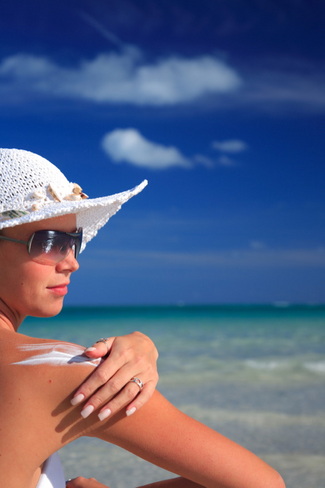Heath – Sun Protection

What’s your advice for sun worshippers?
Remember that the risk of skin cancer is real. No one is exempt, including people with dark skin. But you are at increased risk if you have fair skin, moles, light eyes, or a family history of cancer, or if you’ve had a lot of sunburns and/or expsoure to sun throughout your life, or you live in a sunny area. Before you go outside, check the UV index at epa.gov/sunwise/uvindex. If it’s high, try to minimize your exposure time, especially from noon to 4 p.m., when the sun is strongest. Always wear sunscreen and reapply every 2 hours, more often if you swim or sweat. If you’re at the beach, lie under an umbrella. Choose one that you can’t see thourgh; a thicker one should offer more UV protectionn.
You’re a mom of two young boys. What’s your sunscreen plan?
I use at least SPF30 on any exposed skin when they’re outside and try to stay in the shade. And if it’s a high-UV-index day, I consider indoor activities. They also wear clothes with tightly knit fabrics as a physical barrier between them and the sun’s rays, and cute, wide-brimmed hats to protect their heads, ears, and face. We usually go to the beach earlier in the morning or later in the day, and they always wear T-shirts. I take extras because wet T-shirts offer less UV protection than dry ones do. Day care puts sunscreen on my son when he goes to the park, but I ask that he be rinsed off when he gets back because I worry about chemicals. And we take baths after a day at the beach. Oh, and I buy shorts that are a bit big because I figure they will cover more skin!
What does the future of sunscreen look like?
We need the Food and Drug Administration to step it up and really check the safety of sunscreen ingredients. Manufacturers of mineral sunscreens (with ingredients like zinc oxide and titanium dioxide) that claim not to use nanotechnology might offer a better choice, but we haven’t yet tested the latest non-nano products for performance or for the truthfulness of those claims. Nanoparticles help make sunscreens blend better into your skin, but they might come with potential health risks like reporductive and developmental effects. Bring back lifeguard nose!

